Are Hostels Safe? What To Expect & How To Stay Safe
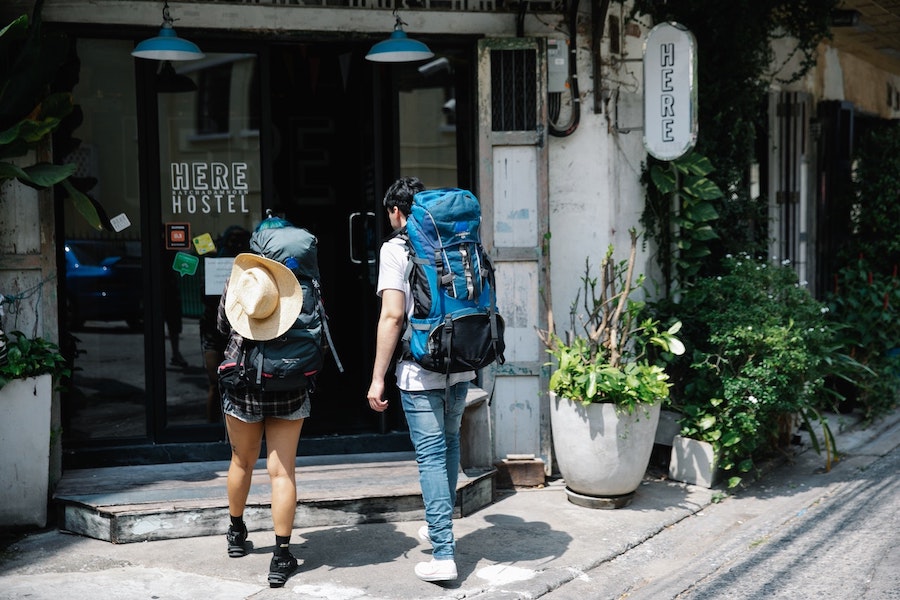
Are hostels safe? Here’s what to expect, and how to avoid the sketchy ones.
So you’re about to kick off a backpacking trip of a lifetime and wondering if staying in a hostel is safe. I’ve stayed in more hostel dorms than I can count, and I want to pass on what I’ve learned along the way.
You’ve probably sorted your route. You know what you want to see and do. But have you decided where to stay? If you’re here, you’re clearly considering a hostel.
You should be. Hostels aren’t just a rite of passage. They can be one of the best parts of the trip. Cheaper, more social, sometimes sketchy, but usually a solid choice if you know what to look for.
In this guide, I’ll break down hostel safety. From what to expect, what can go wrong, how to avoid it and how to book smart. I’ll finish with a few FAQs and first-hand tips worth knowing.
Are Hostels Actually Safe?
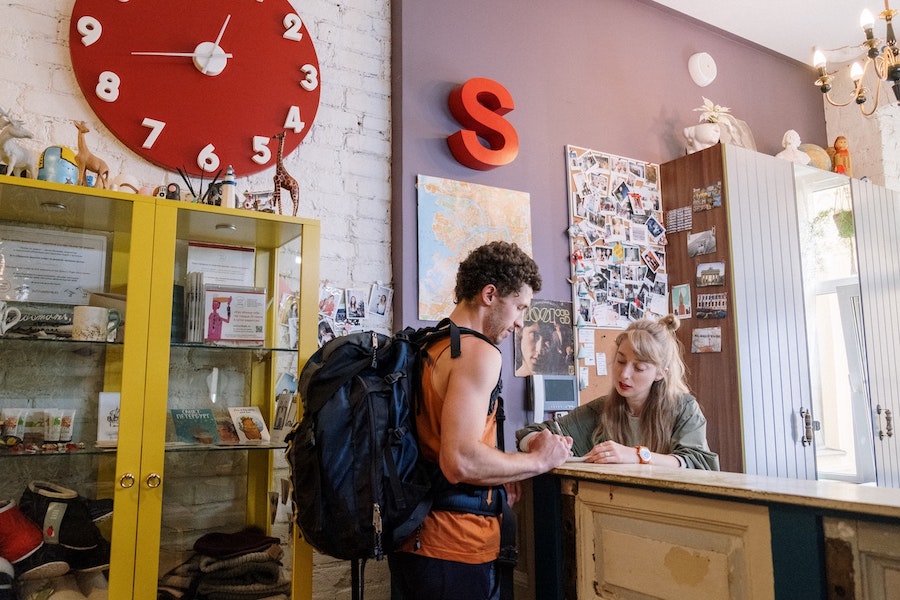
Most of the time, I’d say yes. Hostels are generally safe if you pick the right ones and don’t switch your brain off. They’re social, affordable and in most cases pretty well run. I’ve stayed in hostels across Central and South America, Africa, Europe, Asia and Australia, and I’ve never had a serious issue. No theft and no real safety concerns.
The people staying there are usually just like you. Budget travellers, solo wanderers, and groups trying not to blow their trip money on expensive hotels. And while you’ll always get the occasional oddball, there’s often a low-key sense of community. Most people are just out to have a good time and maybe meet a few others on the same path.
That said, with a constant turnover of guests, things can slip. Lax security, missing lockers, dodgy dorm-mates. Incidents are rare but not impossible. You can avoid most of the nonsense with a bit of common sense and by choosing hostels that actually care about who they let through the door.
There’s something out there for every kind of traveller, and if you know how to pick one, it’s a perfectly safe way to travel.
What Can Go Wrong in a Hostel?
Most hostel stays go off without any problems. But you’re still sleeping in a shared room full of strangers, so a few things can go sideways if you’re unlucky or not paying attention.
Theft does happen
Not very often, but often enough that you should keep your valuables locked up. Phones, expensive cameras, passports and wallets are the main targets. Don’t leave them lying around and then expect them to be there after breakfast.
Dorms can be chaotic
Think drunk snorers stumbling in during the early hours, people having sex in the bunk below, or just loud groups who don’t even know you’re there. You can’t control who’s in your room, but you can pick smaller dorms and read the reviews.
Security can be hit or miss
Some hostels don’t bother with lockers, others hand out actual keys instead of keycards. If there’s no reception overnight and anyone can walk in, it’s a no from me.
Bad location? No thanks
You don’t want to be walking down dark side streets with no one around, or stuck miles from the centre. A cheap bed in the wrong area isn’t worth the sketchy walk back (I’ve had more of these than I’d like).
And while it’s rare, some places have had proper incidents. Fires, break-ins, you name it. If you’re into morbid reading, look up the Downunder Hostel fire in Sydney. Doesn’t mean hostels are dangerous; it just means you should do your research.
How to Choose a Safe Hostel

Not all hostels are equal. Some are spotless, secure and well run. Others feel like a squat with bunk beds. Here’s how to pick one that won’t have you regretting your booking by check-in.
Read the Reviews — Properly
I used to just check the star ratings, but these are useless without context. Read into the most recent reviews on Hostelworld and Booking.com, especially from solo travellers. Look out for mentions of dodgy staff members, broken lockers, bad lighting or people walking in off the street. If someone mentions theft or feeling unsafe, take it seriously.
I once booked a hostel before hiking the Inca Trail. The reviews were excellent. What I missed was that everyone loved the parties that the hostel hosted every night. Not exactly the best prep for a 4am get-up.
Prioritise Location and Lighting
A cheap bed’s no use if you’re walking 20 minutes through back alleys to get there. Look for hostels in central, well-lit areas with access to public transport or busy streets. Somewhere you can get home at night without worrying what’s lurking around the corner.
If a place looks sketchy on Google Street View, then it probably is. But keep in mind that hostels in the centre come with noisy streets, so again, check the reviews!
Look for Proper Security Features
At a minimum, your hostel should have:
- Lockers big enough for your main bag
- Keycard access or proper locks on doors
- Reception staff present or on call overnight
- CCTV or at least basic surveillance in public areas
If a hostel doesn’t mention security at all, it’s probably not a priority for them.
Pick the Right Hostel Type for You
Hostels have moved on from creaky bunks and cold showers. Here’s what to expect from the main types and what they mean for safety:
Flashpacker or Boutique Hostels
More like budget hotels with hostel vibes. These are usually the safest option. Think keycard access, private rooms, and chilled guests. Ideal if you’ve got a bit more to spend.
Party Hostels
Fun, chaotic and often loud as hell. Great for meeting people, terrible for sleeping. Security can be hit or miss, especially if the bar’s open all night. You’ll want solid lockers and maybe earplugs that could drown out a freight train.
Budget Hostels
My old go-to hostel! Cheap, basic and sometimes brilliant. Sometimes not. Check for working lockers, staff presence and noise reviews. These are hit or miss, depending on the country.
Adventure Hostels
Surf camps, ski shacks, jungle eco lodges. Adventure hostels are usually niche and attract a specific crowd. The setup might be rustic, but they’re often tight-knit and well run.
Family Hostels
Low key, often quieter and more relaxed. A good option if you want a break from the backpacker madness. Safety usually isn’t an issue here.
Eco Hostels
These attract a certain type. Laid back, conscious, usually respectful. You’ll still want the basics like lockers and staff presence, but vibe-wise, these are rarely dodgy.
Are Hostels Safe For Solo Female Travellers?
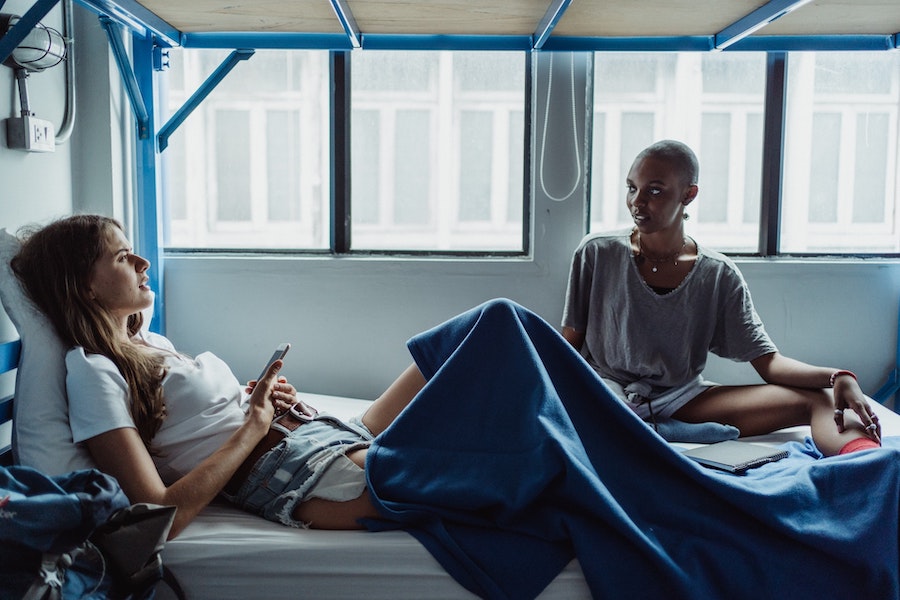
Hostels are generally safe for solo women, especially if you do a bit of research and pick the right kind of place. I’ve met more women travelling solo than men, and most of them rave about their hostel experience.
That said, sharing a dorm with strangers can feel uncomfortable at first. So here’s what you need to know.
Choosing the Right Dorm Setup
If the idea of sharing a mixed dorm doesn’t sit well with you, don’t do it. Many hostels offer female-only dorms, and they’re usually quieter, cleaner and feel more secure. Private rooms are also an option in many places, but that obviously comes with a higher price tag.
Bathrooms are often gender-separated (not always), and most hostels have clear policies about who stays where. Don’t be afraid to ask before booking.
Knowing When to Leave
If something feels off, trust your gut. That’s not just for dodgy dorm mates, it includes weird staff, sketchy surroundings or just a vibe that doesn’t feel right. Speak to reception, ask to move rooms or walk out completely if you need to. Any decent hostel will want you to feel safe. The good ones care about their reputation.
Real Talk: Staff, Other Guests and Boundaries
Most people in hostels are just there to travel, chill and maybe meet a few mates along the way. You’ll find that solo travellers, especially women, tend to look out for each other. But boundaries matter. You don’t owe anyone a chat, a drink or your plans for tomorrow. If someone makes you uncomfortable, say so or walk away.
Staff should always be on your side. If they aren’t, you’re in the wrong place.
💡 Pro Tip: When using sites like Hostelworld or Booking.com, just use the ‘filters’ and select ‘Female Dorm’ to find all the female-only rooms available!
Are Hostels Safe In Europe (vs Asia or Latin America)?
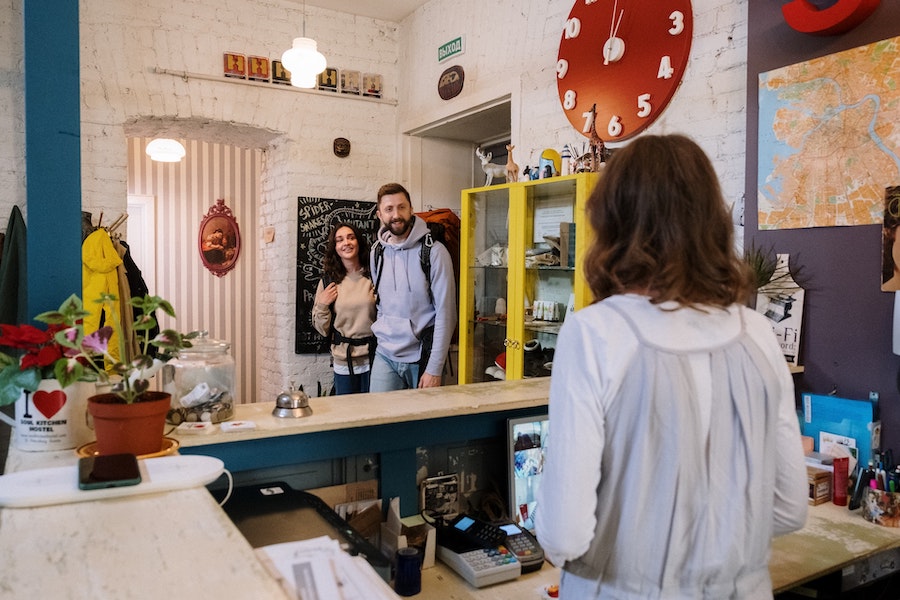
Hostel safety varies a bit depending on where you’re headed. Europe tends to be the safest. Asia is usually relaxed but sometimes a bit casual with security. Latin America takes more street smarts. Here’s the quick breakdown.
Europe: safest overall, but not flawless
European hostels are more expensive but generally solid for safety. Most cities have a range of options, and standards are decent. The main thing to watch out for is theft, especially in big cities like Barcelona, Rome or Paris, where pickpocketing is a full-time job.
Inside the hostel, though, you’re unlikely to run into serious problems. Look for places with working lockers, staffed reception and decent reviews. It’s rare to find hostels in really sketchy areas, but check the map before you book. Cheap often means out of the way.
Asia: clean, chill, but sometimes lax on security
Asia’s hostel scene is surprisingly good. In places like Japan, South Korea and Thailand, you’ll find spotless dorms, friendly staff and a chilled-out crowd. But some hostels are a bit too relaxed when it comes to security.
Doors might not lock. Lockers might be optional or too small for anything that matters. It’s usually safe, but you still need to pay attention. Don’t assume everything’s sorted just because the hostel looks cute on Instagram.
Latin America: do your homework, trust your gut
This is where hostel safety gets more situational. In countries like Colombia, Peru or Mexico, hostels range from brilliant to barely holding it together. Most are totally fine, especially in tourist hotspots, but you need to be more aware of your surroundings and the neighbourhood.
Read recent reviews. Check how secure the front entrance is. Look for proper lockers and staff who are around after dark. And if something feels off, move.
Tips to Stay Safe in Any Hostel
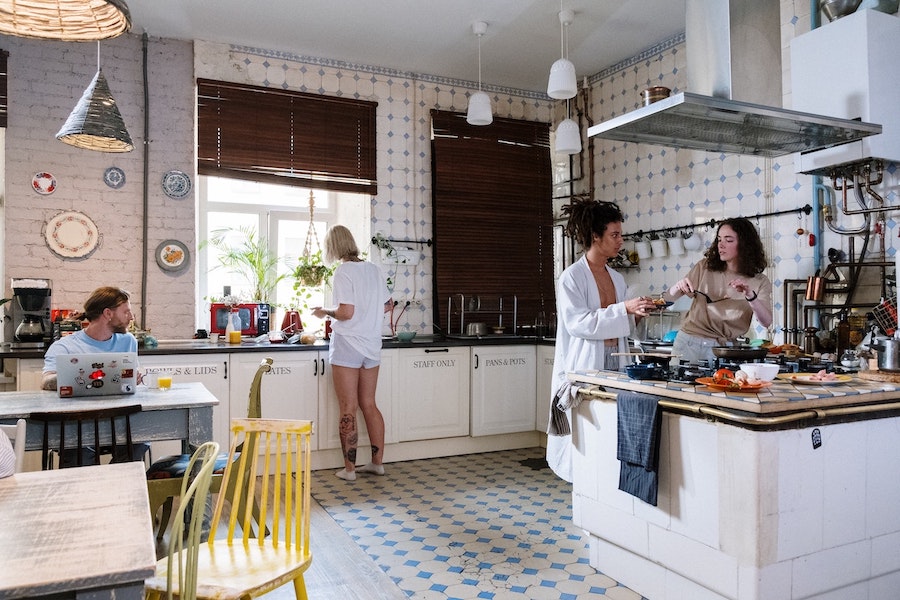
Most hostel safety comes down to common sense and a bit of prep. I still remember my first time in a Sydney hostel. Everyone else seemed to know exactly what to do and how it all worked.
I didn’t know about things like lockers and still had a money belt hidden under my clothes. Remember those? I was also lugging around a giant DSLR camera because smartphones didn’t exist yet.
You might feel awkward the first time you walk into a dorm or a communal kitchen. But these tips should make things a bit smoother.
Bring a padlock
Most hostels have lockers, but they don’t always give you a lock. Bring your own. I usually have one with a number code so I don’t lose the key. Use it every time you leave your stuff in the room, even if you trust your dorm mates.
Leave the valuables at home
If you don’t want it stolen, don’t travel with it. That flashy watch or expensive laptop might seem like a good idea at the time, but it also makes you a target. Keep it simple and low-key. You won’t miss the extra gear, and no one’s judging your outfit.
Book the right place
Sounds obvious, but it’s easy to get lured by price. If a hostel has no lockers, no reception after dark and is in the middle of nowhere, maybe give it a miss. Read the reviews and look for red flags.
Trust your gut
If something doesn’t feel right, like the vibe, staff, or someone in your room, listen to it. You’re not being paranoid. Ask to change rooms or leave completely. Your safety is worth more than a prepaid night.
Don’t flash your stuff
Even inside the dorm, don’t leave your phone, wallet or passport lying around. Lock it up or take it with you. You don’t need to be suspicious of everyone, just not careless.
Pack the night before
If you’ve got an early checkout or a bus to catch, pack quietly the night before. Waking people up at 3am while you rummage through your bag makes enemies fast. And enemies don’t watch your stuff.
Earplugs and an eye mask
Not technically a safety tip, but your sanity counts. If you want to sleep through the drunk snorer or early riser, pack these. You’ll feel less wrecked and less vulnerable when you’re actually rested.
The Worst Parts of Hostel Life (and How to Avoid Them)
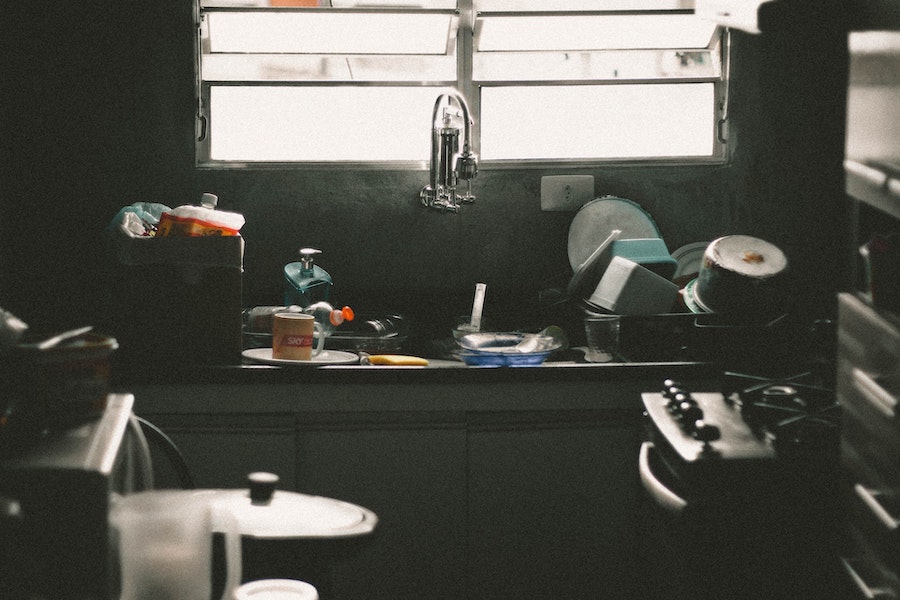
Hostels aren’t luxury hotels, so you can’t expect perfection. You’re sharing space with strangers, and that comes with a few low points. Doesn’t mean they’re unsafe or not worth it. Just that you’ll want to be prepared.
Snorers, drunks and dorm drama
You’ll meet the 4am rustlers (guilty!), the guy who snores like a chainsaw, the couple having sex in the bunk next to yours, and maybe even the traveller who’s done everything better than you. It’s all part of the charm.
Pick smaller dorms if you want more peace. Bring earplugs, an eye mask and don’t be afraid to move rooms if someone’s unbearable. And if someone’s making it weird, speak to the staff. It’s their job to ensure you’re safe.
Dirty bathrooms and noisy beds
Shared bathrooms can be grim depending on who’s been through before you. Bring flip flops, your own towel and don’t expect spa conditions. And yes, sometimes you’ll need to pee at 4am and the bathroom’s two corridors away. It happens.
Bunk beds aren’t always quiet. If your bed squeaks every time you breathe, try switching or slipping a sock in the joint. No guarantees, but worth a shot.
Party hostels when you want peace
Some hostels market themselves as “social” and then drop you into a three-night bar crawl. Great if you’re in that headspace, awful if you’re trying to sleep or catch a flight the next day.
Read the reviews. If people mention noise, bars, or someone vomiting in the hallway, take it seriously. If you accidentally book one, don’t try to power through; just move. Your sanity will thank you.
Unwritten Hostel Etiquette (That Actually Matters)
Every hostel has rules, but it’s the unwritten ones that decide whether your dorm mates secretly hate you. You don’t need to be perfect, just not that guy. Here’s what actually matters:
- Pack quietly if you’re leaving early. No one wants to hear your zip-and-crinkle routine at 5am.
- Don’t leave your mess in the kitchen. You cook, you clean. Easy.
- Keep your phone on silent. Especially at night. No one cares about your 2am Instagram scroll.
- Respect other people’s space. Your backpack doesn’t need its own bed.
- Don’t hook up in a shared dorm. Seriously. Go get a private room like an adult.
Staying In A Hostel Vs Staying In A Hotel
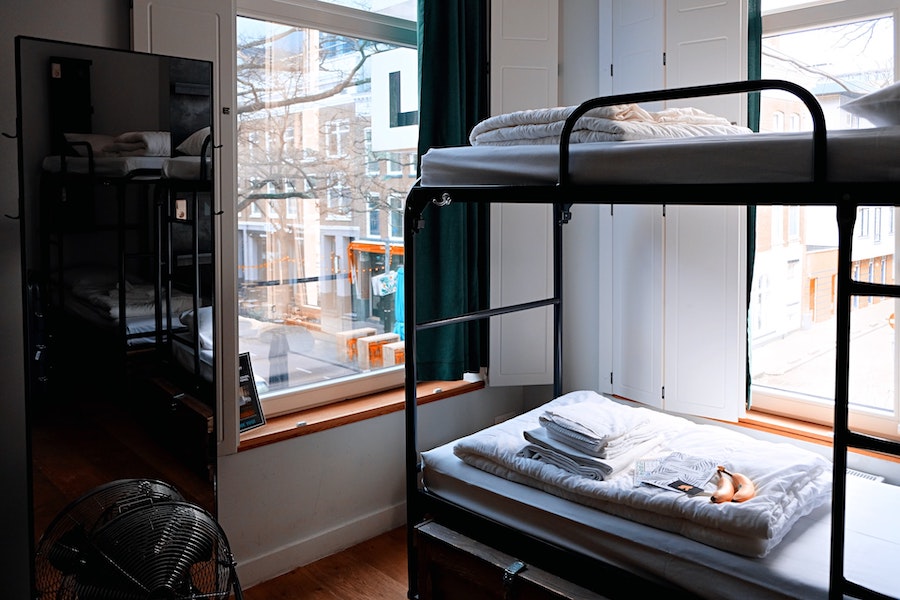
So how do hostels stack up against hotels when it comes to safety? You’re probably weighing up the pros and cons already. Here’s how they really compare.
Which is actually safer?
Hotels usually win on security. You get private rooms, 24-hour staff and CCTV everywhere. But that doesn’t mean hostels are unsafe. A well-run hostel with proper lockers, reception staff and decent reviews can feel just as secure, especially if you go for a smaller dorm or a private room.
Hostels just have more variables. You’re sharing space with strangers, the front door might not be monitored overnight, and you need to be more careful with your stuff. That said, most people in hostels are travellers like you, not thieves. Your gear is more likely to disappear from a hotel lobby than a locked dorm locker.
Trade-offs: privacy, people, price
Hotels give you space, peace and predictability. Ideal if you want to shut the world out. Not ideal if you’re travelling solo and want to meet anyone.
Hostels are social. You’ll meet people, join tours, get local tips and probably end up at a bar with someone you met five minutes earlier. They’re cheaper, more communal and easier if you’re moving around a lot.
If you need rest, choose a quiet hostel or book a private room. If you want to meet people and save money, hostels win every time. Safety is just about picking the right one.
FAQs About Hostel Safety
Still got questions? Here are a few of the most common things people ask before booking their first hostel.
Are hostels generally safe?
Yes, especially in well-travelled parts of the world. Just book smart, follow basic safety habits and trust your gut. If a hostel looks dodgy online, it probably is in real life too.
How common is theft in hostels?
Not very. Theft can happen anywhere. Even a cleaner in a fancy hotel isn’t above temptation. But in decent hostels with lockers and basic security, it’s rare. Most travellers are just trying to sleep, not steal your passport. Still, lock your stuff and don’t leave things lying around.
Should you bring a lock to a hostel?
Yes. Most hostels have lockers, but they rarely provide locks. Bring your own, ideally one with a combination, so you’re not fumbling for keys when you’re half asleep.
Can couples sleep together in hostels?
Yes, but not in the same bed unless you’ve booked a private room. Most dorms are set up with single or bunk beds, so couples can stay in the same room, but usually not side by side. If you want your own space or a double bed, go for a private or double room. Plenty of hostels offer them.
What is better, staying in a hostel or a hotel?
Depends on what you need. Hotels are private and usually more secure. Hostels are cheaper and more social. If safety is all you care about, go hotel. If you want to meet people and stretch your budget, hostel every time.
Wrapping Up: Are Hostels Safe?
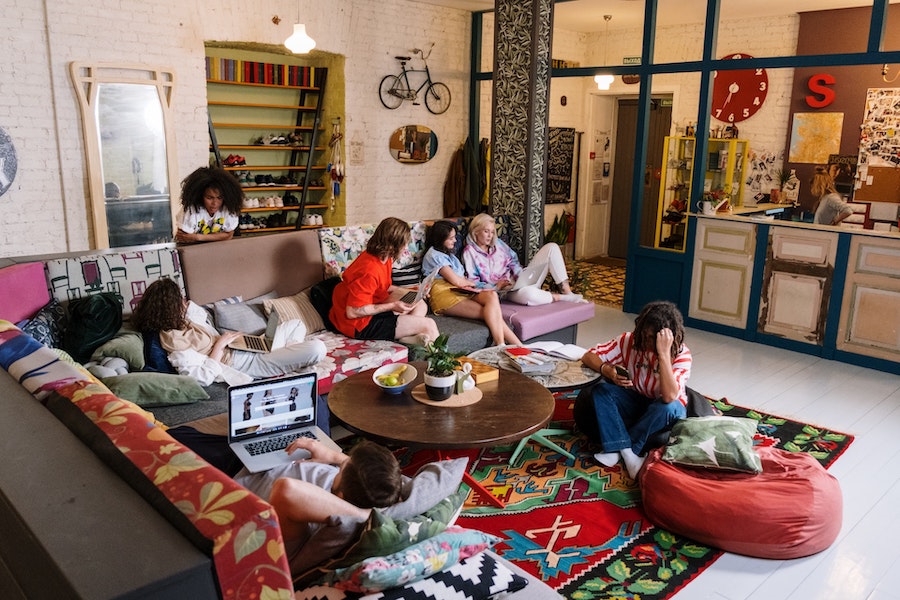
So, are hostels safe? Yes. Most of the time. Like anything in travel, it comes down to picking the right place and keeping your head screwed on.
We still stay in hostels occasionally when we travel, although we opt for a private room these days. The friendly staff, excellent meal options, and tour options are just some of the reasons why we still do it, after reading the reviews, of course.
If you’re still unsure, book a private room for your first night and ease into it. Hostels can feel awkward at first, but once you’ve settled in, the vibe is usually relaxed, friendly and far less intimidating than it seems online.
Before long, you’ll be hopping between cities, meeting people, saving money and wondering why you ever considered blowing your budget on hotels.
Stay alert, be open-minded and remember, almost everyone in that dorm has felt the same nerves at some point. Just think, one day you’ll be the one welcoming a new dormmate to the hostel experience.

